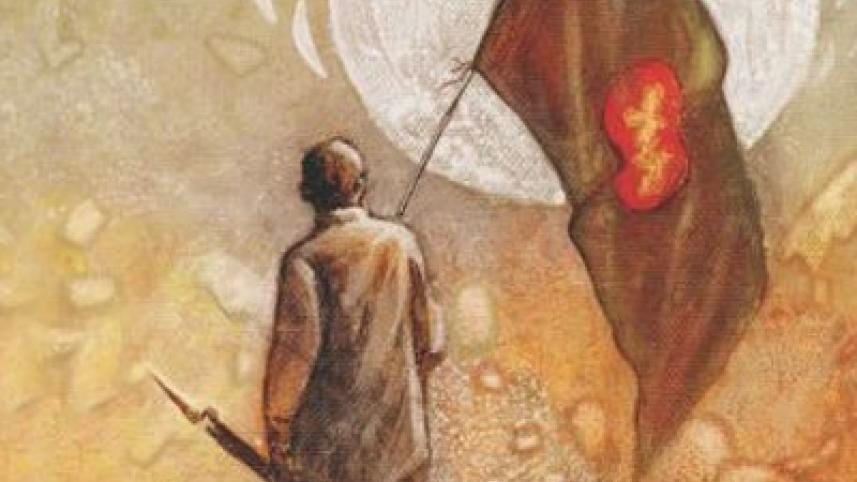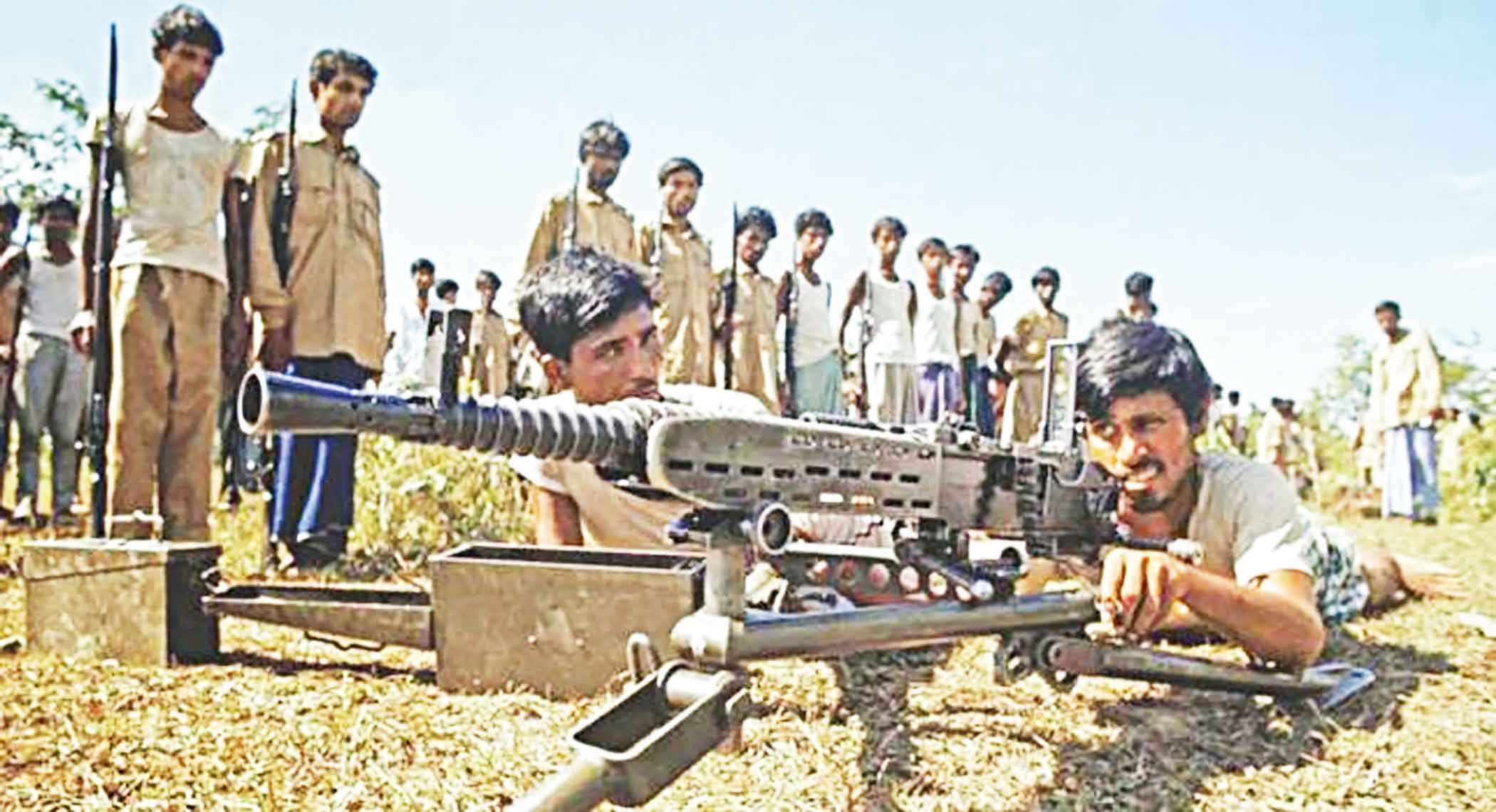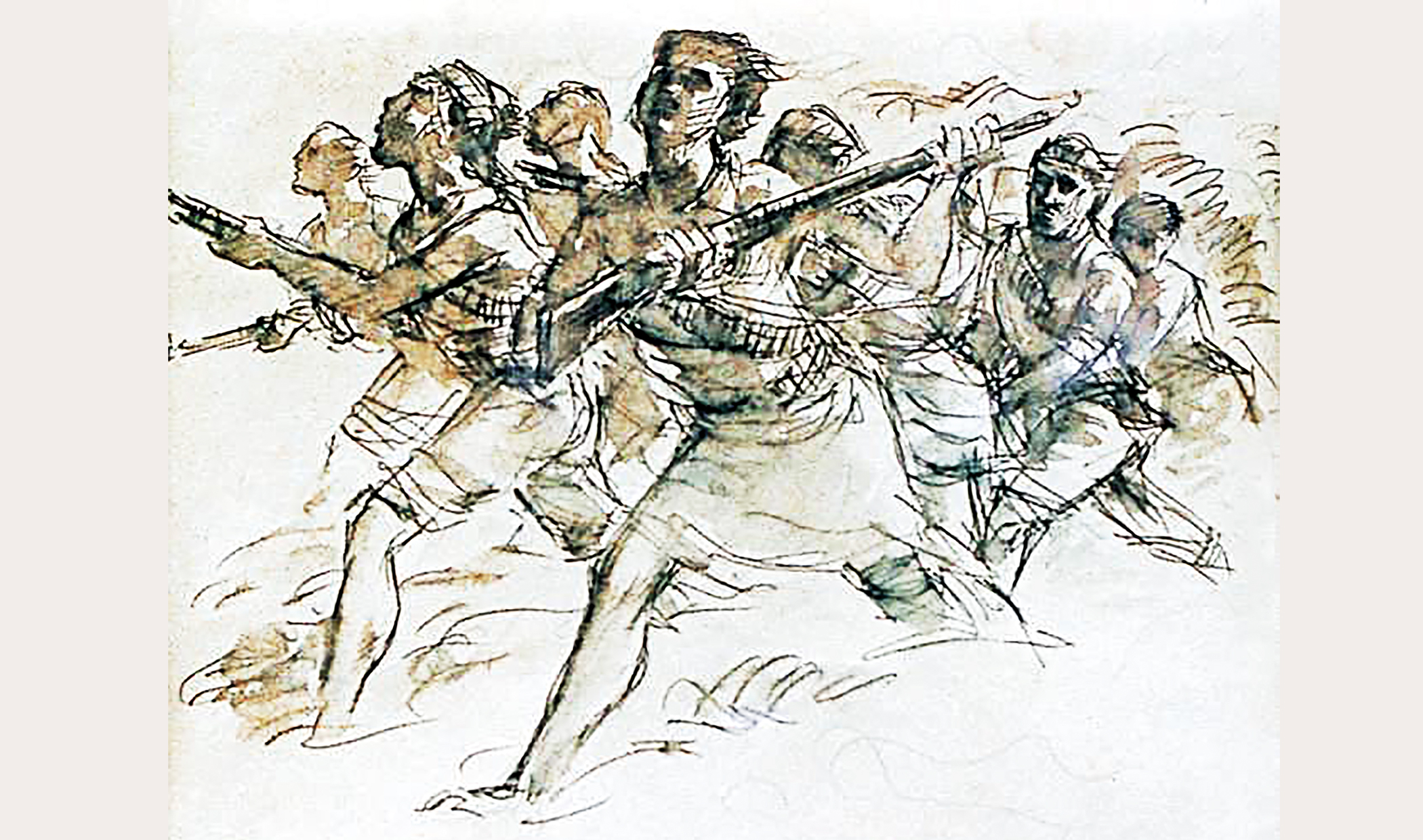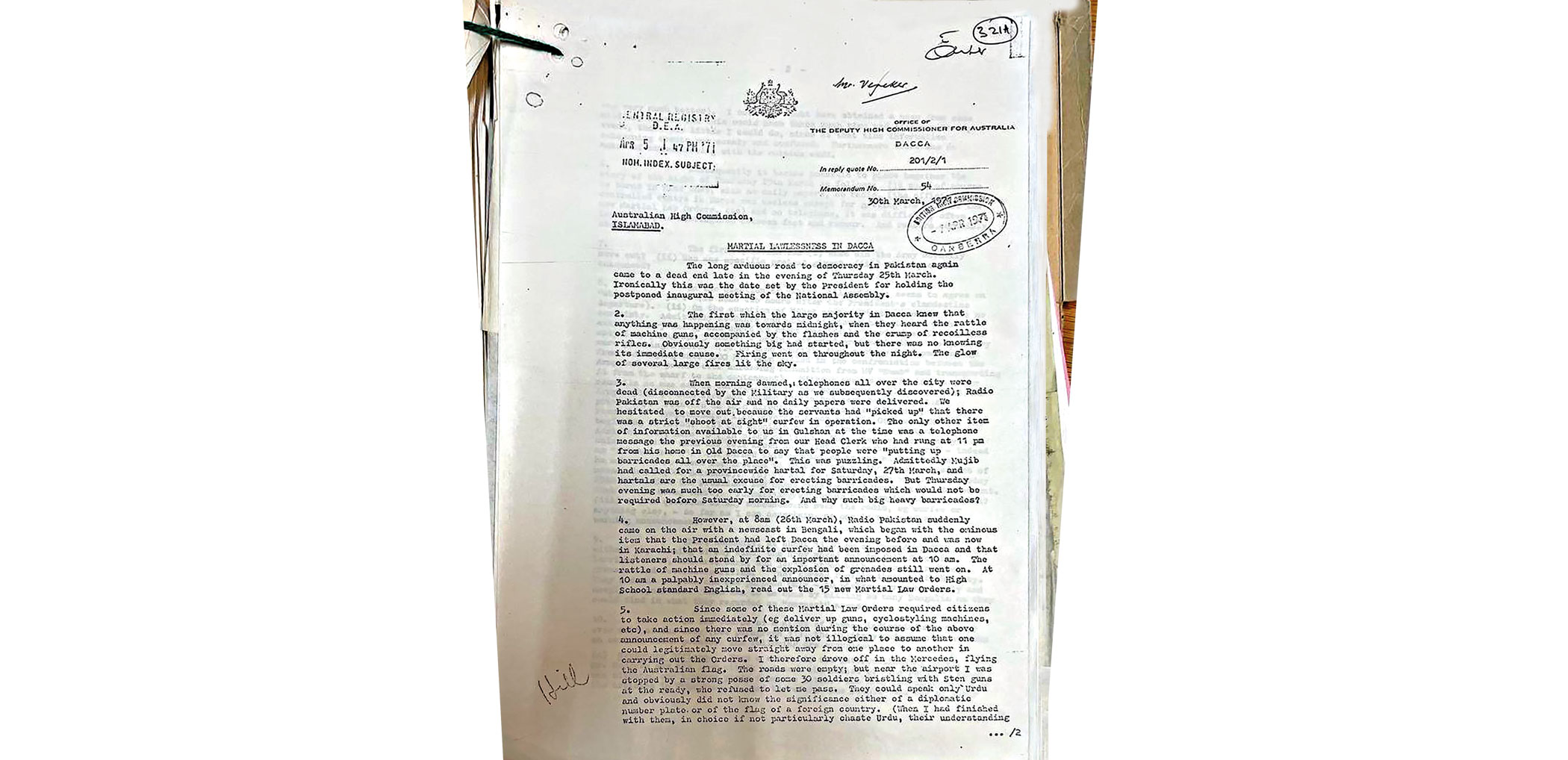The unfinished struggle for a democratic, egalitarian state

The year 1971 was a time of tremendous difficulties. All of us were in grave danger. Every day, every night, and every moment was overshadowed by terror. We were worried about our personal security, and that of our close ones, but we were also busy with other, broader concerns. We would communicate news, try to find out what's going on everywhere else, keep an ear to the radio, and wonder about how we could help the freedom fighters. Of course, those who were actively fighting the war were in dire straits. Terror tailed us everywhere, but we had dreams, too. There was an enormous, collective dream for what the future ahead of us should be like. We had hope that we would chase away the invaders and we would be free. And we worked towards that goal. Everyone was ready to contribute however they could.
We still think and plan, and shudder from nightmares, but the collective dream is long gone. We don't worry about freeing everyone anymore; we only think of ourselves. What will happen to me? What can I get out of something? It's not as though we didn't think in personal terms during 1971. Of course we did. But in those dark times, we knew that our personal freedom was tied up with freedom for all. We knew that if the country couldn't be freed from invaders, none of us would be spared. Thus, the struggle to survive became universal. Back then, not everyone was in the same location. Some were in the country, others were abroad. But wherever we were, the worry was the same: when will we be free?
So what has been our experience since this victory was achieved? Well, it turned out that our community was fractured. Our dreams turned personal; we didn't have time to take into account the collective interest. Yet, there was so much still left for us to achieve together! We needed to eradicate poverty and invest in industry. We needed to be more conscientious, and excel in education. But the collective effort to bring about these improvements never materialised. All that is being done is being done on an individual level.
It is worth figuring out why we can't do things collectively anymore. But once we start thinking, it feels impossible to make sense of the situation. We often blame our political leaders for our failures. It's certainly true that the established political leadership was unable to bring us freedom in its true sense, but it was also through the political leadership that this country achieved independence. They were the ones who had built the movement for our freedom, not bureaucrats, businessmen, or professionals. The only ones who can claim credit for the freedom movement are those who were involved in politics. Only they couldn't take us too far; they reached a limit, and there ended their journey.
So what has been our experience since this victory was achieved? Well, it turned out that our community was fractured. Our dreams turned personal; we didn't have time to take into account the collective interest. Yet, there was so much still left for us to achieve together! We needed to eradicate poverty and invest in industry. We needed to be more conscientious, and excel in education. But the collective effort to bring about these improvements never materialised. All that is being done is being done on an individual level.
Yes, the state has evolved. The state we had during the British colonial era was quite large. But it was reduced in size when Pakistan was established. Bangladesh is even smaller and newer. But how new is it really? Herein lies a crucial problem. We established a new state, but the bureaucratic structure and characteristics of the old British and Punjabi states have remained with us. Independent Bangladesh is similarly bureaucratic; it has not changed. The laws, the judicial system, the administration, and various law enforcement forces of those times have been left behind to this day.
In a bureaucratic state, the power lies with the bureaucrats. In British India, bureaucrats were everywhere and in everything. During Pakistani rule, too, it was bureaucrats who ruled the state, while their military counterparts conducted the genocide in East Bengal. Even in Bangladesh, we have repeatedly encountered military rule, caretaker governments, and emergencies. Even when it seemed like it was political leaders who were ruling the country, the keys to power remained with the bureaucrats.
Bureaucratic governments can never be democratic; they never have been, and there is no way for them to be so. Democracy requires accountability. With bureaucracy, there is little scope for that. In a democracy, power is distributed among many. But bureaucratic systems lead to the centralisation of power. Public representatives rule in a democracy, and government officers rule in a bureaucracy. Bureaucrats think nothing of the interest of the country, and only consider their own interests.
The failure of our political leaders is that they have been unable to dismantle the bureaucratic state and replace it with a democratic one. They gained the power to rule the state and called it a day. And though they soon realised that the true control over power had gone to the hands of bureaucrats, the political leaders thought they had become one with the bureaucracy. Even today, our politicians don't seem to realise that they needed to establish public ownership of a state that had been earned through a public struggle.
The political leadership we speak of isn't any different from a ruling class. A strong ruling class has risen in Bangladesh, which doesn't want the people to prosper, and only wants prosperity for itself. It is this same ruling class that has, at different points in time and under various guises, infiltrated and taken over the state. And, with the help of bureaucrats, this class rules the country. They fight amongst themselves. But these fights, that often turn ugly, are never over ideological differences. After all, the ruling class and the bureaucrats share the same ideology. These fights occur between plunderers from both groups. The main stream of politics for them is the fight over spoils.
As for their shared ideology, it is known universally as capitalism. Theoretically, capitalism leads to innovation. But the breed of capitalism that has taken root in our country is not interested in innovation, only in plundering. On top of this, all we are left with are the ills of capitalism, such as the obsession with self-interest and luxury. And this was not the case in 1971.
In 1971, everyone's interests were aligned, and seeking luxury was not even an option. People were only motivated towards freeing the country, and for this they were ready to make sacrifices. The spirit of the Liberation War that we speak of is a democratic one, with its foundation being the establishment of equality in terms of rights and opportunities. It was on the battlefields of 1971 that this equality was realised. The war was not limited to any specific geographic location; it was happening all across the country. And, in a way, the war also took place abroad, given the involvement of expatriates in the freedom movement.
After the war, the ideology of capitalism made a return. The British state was run with that ideology, the Pakistanis were proponents of the same, and now the rulers of Bangladesh have taken refuge in that same brand of capitalism. As a result, the ideology of the state, let alone the ideology of our society, has remained unchanged.
What do we need to reverse the tide? The first item on the agenda would be employment. The people of this country are not lazy; they want to work. When relief workers visit disaster-stricken areas, the locals appreciate the aid but strongly express their need for employment. This need reverberates all throughout the country. Our people are desperate for work, maniacally chasing opportunities both at home and abroad. In foreign countries, Bangladeshis eagerly take up jobs that the locals refuse to do, all while the ruling class here fails to show interest in providing employment opportunities. Governments come and go, corruption rises, but the scope of employment does not improve.
We need more investment if we want more employment. Investment requires capital, which the rich are in control of. But the rich in Bangladesh are not interested in investment. They express no enthusiasm in building factories, agricultural farms, or pursuing forestation. They don't want to take risks, and only want to plunder. Our bureaucratic state can't even create an environment for investment because bureaucrats only know how bribes work, not how to create jobs.
One deadly ill of capitalism is that it increases inequality. It makes the rich richer and the poor poorer. Bangladesh's history of 52 years reflects a picture of this rising inequality. The unity that had come about through the spirit of 1971 has been trampled on at every turn thanks to this level of inequality. Besides the inequality between the rich and the poor, there is also discrimination between men and women. While women are more present than ever in industry, their safety and dignity are still far from being guaranteed.
The point of pride in 1971 was patriotism. That patriotism has waned now because of the unclenching grasp of capitalism. If we all think only for ourselves, who is there to think of the country? But someone has to. If we lose this country, we will lose our very identities and end up with no place to exist in. We will be no better than moss, floating in one place.
Thinking alone won't help, we need to take action too. The biggest task at hand is to make our state and society democratic. Who will do the thinking and join in this struggle? It has to be those who are patriotic and democratic. They are not few in number, either. The spirit of the Liberation War did not come to be overnight, it exists today and it will always be present.
We need to invest time in this. Otherwise, the prevailing issues will persist. Are we willing to invest that time? Our future depends on whether we can do that or not. A lot of actions are urgent, but we should not forget that the most important one is to establish democracy in our country.
Translated from Bangla by Azmin Azran.
Serajul Islam Chowdhury is professor emeritus at Dhaka University.
Views expressed in this article are the author's own.
Follow The Daily Star Opinion on Facebook for the latest opinions, commentaries and analyses by experts and professionals. To contribute your article or letter to The Daily Star Opinion, see our guidelines for submission.




 For all latest news, follow The Daily Star's Google News channel.
For all latest news, follow The Daily Star's Google News channel. 


Comments